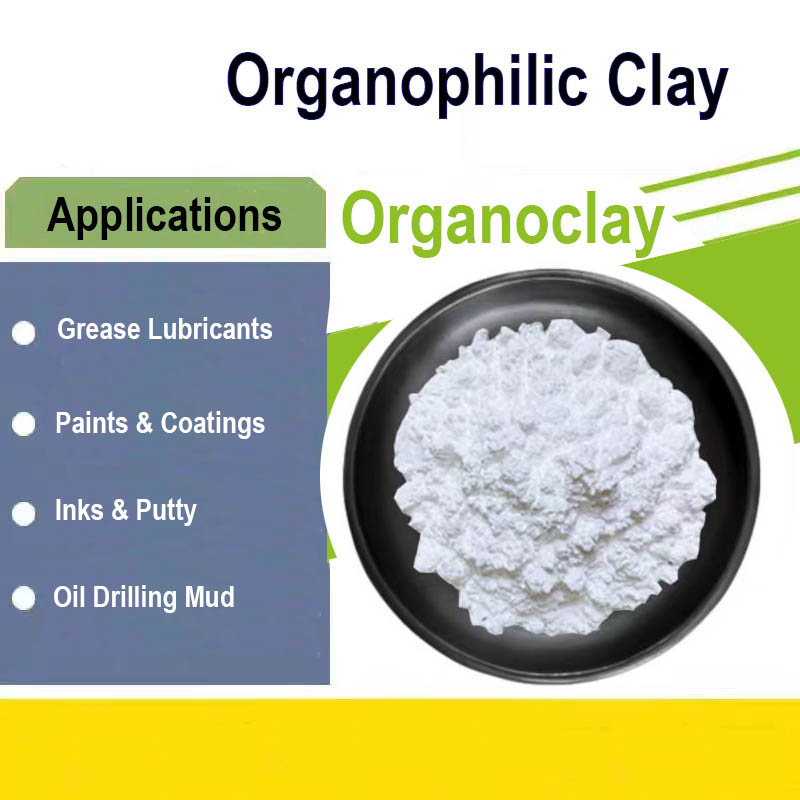Composition of Drilling Mud
Drilling chemicals organophilic clay is an important composition of drilling mud. Water-based drilling mud relies on bentonite clay and oil-based drilling mud mostly relies on the modified bentonite clay version of it, called organoclay.
Water-based drilling mud is usually composed of synergistic combination of bentonite clays, additives, and the unique properties of organophilic clay empowers drilling teams to overcome challenges and achieve optimal drilling performance. The bentonite mineral in this drilling chemical consists of 65% to 75% of montmorillonite.
Organoclay also has an affinity for oil, allowing it to disperse and suspend within the oil-based drilling fluid. The organophilic properties of this clay enable it to maintain stability, prevent sagging, and enhance the overall rheological properties of the mud.
Organophilic Clay Drilling Grade
Chemicals for Industries
Drilling chemicals organophilic clay is widely utilized in the manufacturing of chemicals for various industries. Organoclays are used as catalyst support material due to its high surface area and porosity. It is also employed as an adsorbent or purification agent in chemical manufacturing. It is also used as a thickener and suspension agent. It imparts viscosity and stability to these drilling chemicals.
HDD and Microtunnelling
Another significant application area is in horizontal directional drilling and microtunneling projects. The use of drilling chemicals organophilic clay in these applications helps to stabilize the borehole and maintain the integrity of the drilling fluid. This clay ensures efficient cuttings removal, reduces frictional resistance, and assists in controlling fluid loss, thereby enabling smooth and successful drilling in challenging terrains.
Civil Engineering
Civil engineering projects, such as construction of foundations, tunnels, and infrastructure, also benefit from drilling chemicals organophilic clay. Its inclusion in drilling fluids provides stability and lubrication during the drilling process, ensuring safer and more efficient excavations. The organoclay’s ability to control viscosity and maintain consistent fluid properties is particularly valuable in civil engineering applications.
Oil and Gas
In the oil and gas industry, drilling chemicals organophilic clay is indispensable. It is incorporated into drilling fluids to improve their performance and functionality. It enhances the rheological properties of the drilling mud. The organophilic clay ensures efficient hole cleaning, wellbore stability, and minimized fluid loss. Its unique affinity for oil allows it to disperse and suspend within the oil-based drilling fluids, contributing to smoother and more effective drilling operations.
Geothermal and Well Drilling
Geothermal and well drilling operations rely on drilling chemicals organophilic clay to optimize drilling performance. Organoclay improves the thermal stability of the drilling fluid. It helps to manage high temperatures encountered during geothermal drilling. It preserves the integrity of the wellbore.
Waste Management
Drilling chemicals organophilic clay contributes to the treatment of these fluids by controlling fluid loss. It forms a barrier that prevents the escape of valuable fluids during the waste extraction process. This not only aids in preserving the desired waste composition but also helps in the recovery and recycling of valuable resources.
The organophilic properties of the clay enable it to efficiently encapsulate and stabilize certain contaminants present in the waste fluids. This can assist in mitigating the environmental impact of the waste and reducing the risk of contamination during transportation and disposal.
Suspension Additive Organoclay for Oil Based Drilling Fluids
When employed in oil-based drilling fluids, suspension additive organoclay acts as a crucial agent in maintaining the suspension of solid particles, such as drill cuttings, within the fluid. This gives efficient hole cleaning and prevents the settling of solids. The organoclay’s unique structure and surface properties allow it to effectively adsorb and hold onto solid particles, even under high temperature conditions.
Drilling operations often encounter elevated temperatures downhole, which can cause conventional additives to degrade or lose their effectiveness. However, organoclay is specifically engineered to withstand these extreme temperatures, maintaining its suspension properties and stability throughout the drilling process.
The modified bentonite clay powder used in suspension additive organoclay is carefully processed to achieve high purity levels. This purity is crucial to avoid any potential contaminants that could negatively impact the drilling fluid’s performance or cause formation damage.
Effect of Organophilic Clay on the Stability of Drilling Muds
Drilling chemicals organophilic clay imparts desired rheological properties to oil-based drilling muds. It exhibits specific characteristics such as viscosity, high shear thinning behavior, yield stress, and thixotropy.
The addition of drilling chemicals organophilic clay to oil-based drilling muds provides numerous benefits for their stability. Its high thermal stability ensures performance under challenging temperature conditions. The ability to swell in an organic medium enhances lubrication and reduces friction.
Organophilic clay also possesses the ability to swell in an organic medium, particularly gasoil. The clay particles to absorb and retain the organic fluid within their structure. Organoclay helps to give improved lubrication and reduced friction within the drilling mud.
Use of Cationic–Nonionic-Organo-Montmorillonite in Oil-Based Drilling Fluids
When incorporated into oil-based drilling fluids, cationic–nonionic-organo-montmorillonite exhibits improved apparent viscosities in water-in-oil emulsions. Bentonite clay is more effective at maintaining viscosity and stability when water is emulsified within the oil-based drilling fluid. The presence of water in the emulsion can impact the overall performance and characteristics of the drilling fluid.
In comparison to nonionic-organo-montmorillonite, cationic–nonionic-organo-montmorillonite demonstrates superior performance in water-in-oil emulsions. The cationic nature of the clay enhances its affinity for water and allows for better interaction with the emulsified phase. This results in enhanced stability and viscosity control, leading to improved overall fluid performance of drilling chemicals.

